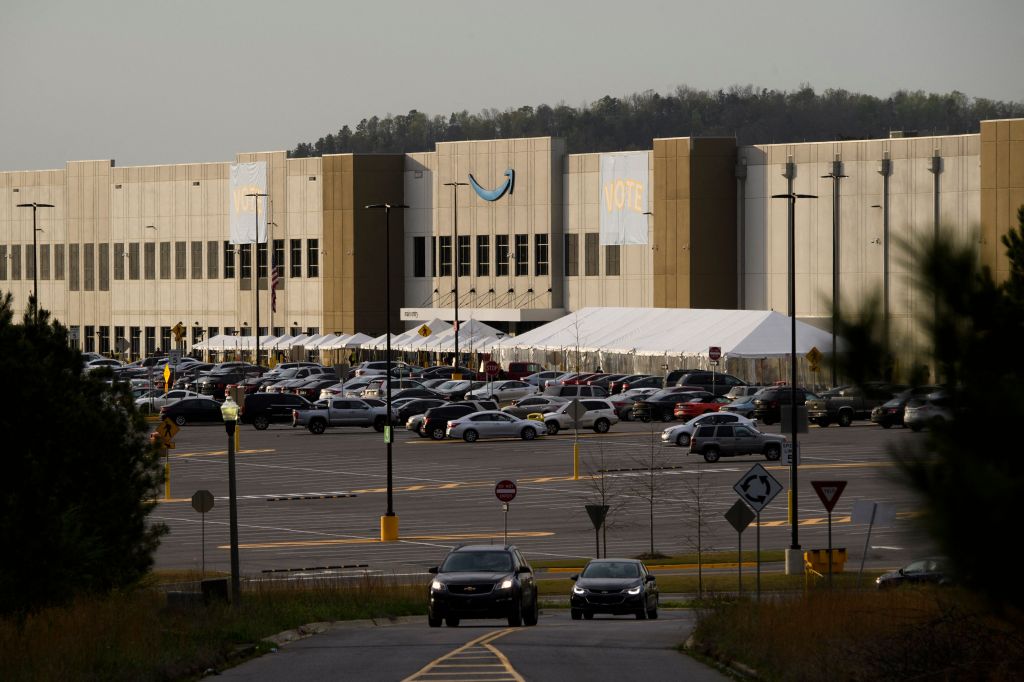As the U.S. labor movement processes the defeat of a high stakes unionization effort in Amazon’s Bessemer, Alabama warehouse, the world’s most powerful companies are taking a moment to celebrate, and remake their case for a future without unions and more of the status quo—which is less pretty than the companies would like to admit. They’re also flipping the narrative to say this is an empowering moment for workers.
On Friday, for example, Chamber of Progress, a new technology coalition that brands itself as “inclusive,” sent out a press release that said Amazon employees’ rejection of the union was a “progressive story,” specifically an indicator of “worker satisfaction with wages, benefits, and working conditions—and that progressive goals are being achieved without unionization.” The coalition’s partners include Amazon, Google, Facebook, Twitter, Instacart, and DoorDash.
Videos by VICE
“The number one driver of unionization votes is worker wages, so this is a pretty powerful signal that Amazon’s Alabama employees feel they’re being paid fairly,” said Chamber of Progress CEO Adam Kovacevich, a former Google lobbyist. “We all want workers to have good pay, benefits, and working conditions. While unions can be a tool for achieving that when workers are being treated unfairly, Amazon’s employees clearly said that isn’t the case in Bessemer.”
“The last few weeks have seen some partisans and union activists project their own agendas onto Bessemer—and they have already started to criticize workers for rejecting a union,” he continued. “Let’s celebrate Bessemer as a progressive success story where workers are already receiving what a union would advocate for.”
Promptly after the defeat of the union on Friday, Amazon invited reporters to interview a group of cheerful, pro-company Amazon warehouse employees on Zoom.
“The people have spoken,” said JC Thompson, one of four Amazon employees who spoke at the Bessemer warehouse press event on Friday. “We do have issues but overwhelmingly we were happy today that this was a win for our coworkers. It wasn’t a win for anyone else but us.”
“When you go down the list of all the benefits Amazon has versus what the union here has traditionally negotiated, it’s just better with what we have now,” Will Stokes, another Amazon warehouse worker, told reporters.
Moments earlier, National Labor Relations Board officials in Birmingham had certified the results of the election, with 1,798 workers voting against the union and 738 voters in favor of the union, in a landslide defeat for the Retail Wholesale and Department Store Union (RWDSU).
On Zoom, the four Amazon workers—who stated that they had not been paid by Amazon to sing the company’s praises—commended Amazon’s wages and opportunities for career growth and recycled many of the company’s anti-union talking points, such as the idea that a union would drain their paychecks and that some of the RWDSU’s Alabama contracts paid less well than Amazon. Alabama is a right-to-work state meaning it cannot collect dues without authorization. Accusing the union of lying, their responses were riddled with misinformation and faulty logic. The Amazon workers spoke about their access to and support from management, while pro-union workers have spoken at length to Motherboard about how many of them have never met or interacted with their managers.
“[Amazon] did a great job of telling us basic factual information,” Stokes, the Amazon warehouse worker, told reporters. “There was so much misinformation coming out and most of it was from the union.”
“For me, I could clearly see this was not something we needed,” said Lavonette Stokes, an Amazon warehouse worker. “I saw some contracts the union negotiated for poultry plants right here in this area, and they were horrific and all I could think of was I need more than a 35 cent year increase. Amazon gives us a 55 cent raise on an hourly basis every six months.”
But this isn’t a logical comparison. The poultry industry is one of the lowest paid industries in the United States, particularly in the South. On average, it pays much less than warehouse work. Meanwhile, Amazon, which its $15 starting wage touts as “industry-leading,” is actually driving down wages in the warehouse industry.
Amazon workers also defended the company’s compulsory anti-union meetings and messages, a USPS mail-box installed on site during the union drive, and other tactics Amazon used to sway workers to vote against the union. (In February, Motherboard obtained text messages from Amazon urging workers to vote from the USPS mailbox they had installed on site.)
“We think the mailbox was a convenience more than anything,” said Stokes. “To my knowledge no manager or person in senior management has tried to influence our votes. Our votes were our votes.”
“The mailbox had nothing to do with the union vote. It was simply for employees,” said Thompson, the other worker.
The unfortunate reality is that much of this anti-union rhetoric will continue as Amazon attempts to utilize its victory to fend off future union drives, and other tech companies take advantage of opportunity to spread the same empowering message.
“It’s easy to predict the union will say that Amazon won this election because we intimidated employees, but that’s not true,” Amazon posted on Friday in a blog post titled “the election in Bessemer.” “Our employees heard far more anti-Amazon messages from the union, policymakers, and media outlets than they heard from us. And Amazon didn’t win—our employees made the choice to vote against joining a union.”




